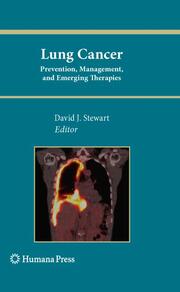-
Zusatztext
-
Defining the Lung Cancer Problem 1 Lung cancer is the leading cause of cancer death in the world. It kills almost as many Americans as cancers of the breast, prostate, colon, rectum, pancreas, and 2 kidney combined, and accounts for 28.6% of all US cancer deaths. With an increase in the 5-year relative survival rate from 13% to only 16% in the more than 2 30 years from 1974 to the present, it will take us another 840 years to eradicate lung cancer deaths if we do not improve the current rate of progress. As discussed in this text, lung cancer prevention has received substantial att- tion. The decrease in smoking in recent decades has helped, but smoking is not the only problem. Lung cancer in people who have never smoked is currently the 5th 3 leading cause of cancer death in the United States. Several factors contribute to the lethality of lung cancer, including the rapidity of tumor growth, advanced stage at diagnosis (due to nonspecificity of early sy- toms and the uncertain efficacy of screening), early development of metastases, and resistance to therapy. Several chapters in this book discuss new molecular targets that may be potentially exploitable in the future, as well as discussing our track record to date in exploiting them.
-
-
Kurztext
-
This comprehensive resource provides authoritative knowledge of the most up-to-date prevention and treatment strategies for thoracic malignancies. Established and investigational therapies are placed in the context of tumor biology for a full understanding of the pharmacogenetics, etiology, and changing epidemiology of lung cancer. Expert clinicians detail the function of predictive and prognostic factors in the utilization of chemo-radiotherapy, adjuvant and neoadjuvant treatment, and targeted agents. The promises and potential pitfalls of investigational strategies are evaluated with exceptional insight and clarity, with unique attention paid to the mechanisms of drug resistance and targets for lung cancer treatment and prevention. Lung Cancer: Prevention, Management, and Emerging Therapies engages the entire spectrum of therapeutic modalities with focus on systemic approaches. Disease coverage includes newly diagnosed and recurrent non-small cell lung cancer, small cell carcinoma, and mesothelioma. Critical examination of the impact, methodology, and design of clinical trials is presented along with new paradigms for personalized approaches and individual risk assessment.
-
Detailansicht
Lung Cancer:
Prevention, Management, and Emerging Therapies, Current Clinical Oncology
ISBN/EAN: 9781617796845
Umbreit-Nr.: 3540555
Sprache:
Englisch
Umfang: xvi, 538 S., 16 s/w Illustr., 14 farbige Illustr.,
Format in cm:
Einband:
kartoniertes Buch
Erschienen am 06.04.2012
Auflage: 1/2012


